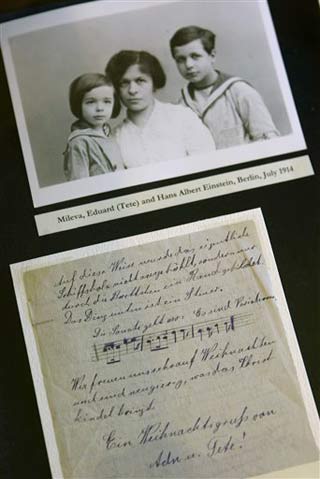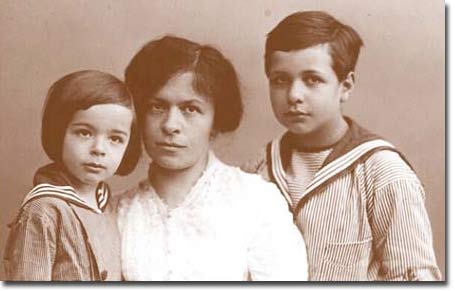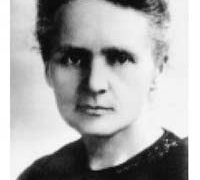Albert Einstein had six lovers and told his wife that they attacked him relentlessly, even though he did not want it. This information was revealed in newly published letters from the great scientist on July 10.
The German scientist, famous for his theory of relativity, spent very little time at home. He traveled to give lectures in Europe and the United States, where he passed away in 1955 at the age of 76. However, Einstein wrote hundreds of letters to his family.
The previously published letters
 |
| Einstein’s first wife with their two sons, and one of the letters from the collection (Photo: cbsnews) |
show that his first marriage in 1903 to Mileva Maric, the mother of his two sons, was extremely unhappy. They divorced in 1919, and shortly thereafter he married his cousin, Elsa. With this wife, he also betrayed her by being involved with his secretary, Betty Neumann.
In the newly revealed letters disclosed yesterday at the Hebrew University in Jerusalem, Einstein described six women whom he was close to and received gifts from while still married to Elsa.
In the early 1980s, Elsa’s daughter, Margot, donated 1,400 letters to the Hebrew University, which Einstein helped establish. However, Margot stipulated that these letters would not be published until 20 years after her death. She passed away on July 8, 1986.
Some of the women described by Einstein include Estella, Ethel, Toni, and “the Russian spy mistress” Margarita. Others were mentioned by initials such as M. and L.
“The fact is that M. followed Dad to England and she clung to him madly”, he wrote in a letter to Margot in 1931. “Among all those women, Dad was really only attached to L. She was truly harmless and decent.”
In another letter to Margot, Einstein requested his wife’s daughter to deliver a small note to Margarita, to avoid prying eyes and gossip.
The new batch of letters also includes responses from Einstein’s family. This helps dispel the misconception that this Nobel Prize-winning scientist was always cold towards his family, said Hanoch Gutfreund, Chairman of the Global Exhibition on Albert Einstein at the Hebrew University. “In these letters, he appears very friendly and sympathetic towards Mileva and his sons,” Gutfreund said.
Gutfreund noted that although Einstein’s second marriage to Elsa was described as “a marriage of convenience,” he wrote to her almost daily, recounting many things including his experiences traveling and teaching in Europe.
“I’m about to be fed up with the theory of relativity,” Einstein wrote in a postcard to Elsa in 1921. “Even that can become boring when someone is too preoccupied with it.”
Einstein lived and studied in Oxford in 1930, where he fled from the fascists. A German colleague, he noted in a letter to Elsa, warned him “not to get close to the German border as the anger surrounding him was uncontrollable.”
In another letter written in 1933, nearly a decade before World War II and Hitler’s genocide of the Jews, Einstein wrote: “Everywhere there is growing fear about the struggle of clever Jews. We are even pressured by our own strength more than by our weakness.”

Einstein’s first wife with their two sons (Photo: AIP)
M.T


















































